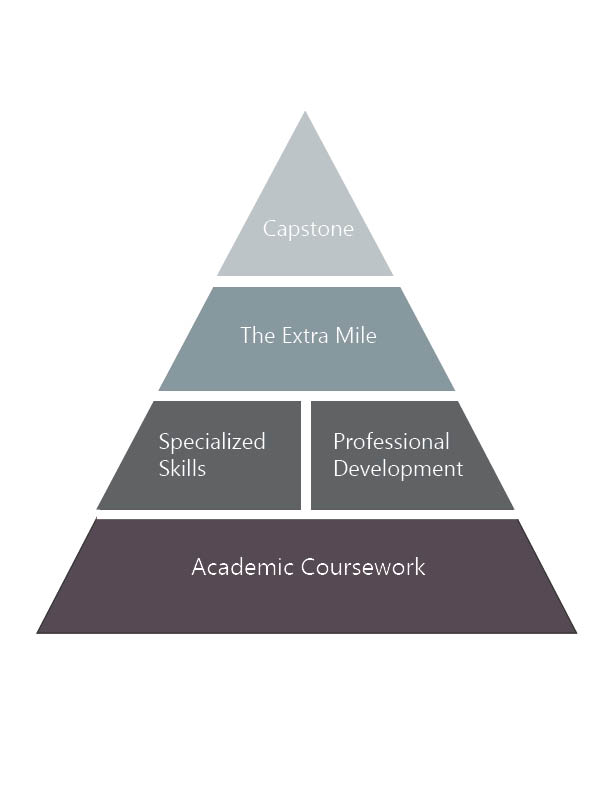
About Paths Certificates
The DMS Paths Certificate Program is a rigorous and engaging career-preparatory program. Students who complete the program will have significantly honed the skills and expertise relevant to their desired career fields, and will have an advantage when entering the professional career market post-graduation. The DMS Paths Certificate Program curriculum is a collaborative effort among faculty, staff, successful professionals, and alumni. The goals of this unique collaboration are to identify the skills in each respective field that will truly set DMS graduates apart from other job candidates and provide the opportunities for current students to develop these skills.
The Certificate Program consists of five components, as shown in the visualization below. Each component represents a variety of requirements to complete the program. To fulfill the requirement within each sections, the student has the freedom to self-direct and select those activities in which he or she is most interested. In total, the student will complete 140 hours of work, equivalent to four full classes. The program is designed to supplement and enhance student’s primary responsibilities and goals; in light of this, the student may work at his or her own pace, and take between 2-4 years to complete the certificate.
 Academic Coursework: The goal of this section is to ensure that students acquire strong knowledge and foundation for a specific career. This include courses at various Harvard Schools, nanocourses, quarter course, as well as courses offered on online platforms such as Coursera and edX.
Academic Coursework: The goal of this section is to ensure that students acquire strong knowledge and foundation for a specific career. This include courses at various Harvard Schools, nanocourses, quarter course, as well as courses offered on online platforms such as Coursera and edX.
Specialized Skills: This section is aimed at strengthening students’ candidacy. To be competitive in the job market, it is important that candidates demonstrate directly related skills required for the job. In this portion of the certificate, students should focus on honing the skills necessary to succeed in their given fields, and produce evidence of their mastery. For example, the Science Communication track might require demonstrable proficiency in writing, editing, and public speaking. One possibility of highlighting students’ aptitude could be writing for Science in the News, running a blog, or lecturing. The requirement for this section can be satisfied by internships, volunteer, or other types of field-specific skill development opportunities.
Professional Development: Transitioning to a professional setting can be challenging, especially when students have spent a number of years in the research laboratory settings. The Professional Development section is meant to help students prepare for this transition and excel in their careers, regardless of the fields they decide to pursue. Learning opportunities or activities that can assist with students’ professional growth such as participating in the PATHFinder course, networking events, and career-skill building workshops may fulfill the requirement for this section.
The Extra Mile: In addition to discipline-specific knowledge, the top skills employers look for in the new hire include critical thinking skill, motivation, and ability to solve problem, work on a team, and manage others. This section is to showcase the ability which go “above and beyond” the traditional graduate experience. It can include activities a student has undertaken that display leadership, management, communication, and conflict resolution skillls, among others. Opportunities to underscore such experiences include assuming leadership positions in student organizations, taking initiative to organize workshops or panel discussion, and services to the community.
Capstone: Halfway through the student’s progress through the certificate program (after the accrual of around 70 hours), students should plan to meet with one of the Paths faculty advisors to check their progress. After the completion of the program, the Capstone provides students the opportunity to reflect on their experiences. The format of the Capstone can be a poster presentation or a portfolio synthesizing the skills the student has learned and developed over the course of the program. It should include a reflection on how s/he has grown professionally and personally.
Mentoring: Building relationships with experienced professionals can be crucial in achieving one’s professional and personal goals. While having mentors are not a requirement of the DMS Paths Certificate Program, we highly encourage students to seek out mentors throughout their careers. Mentors can provide resources, support and guidance. Students can discuss a wide range of topics, from transitioning to careers outside of the academy, improving leadership skills, to seeking and maintaining a work-life balance. To make the most of your mentor-mentee relationships, it is important to communicate what you are looking for (advice, feedback, etc) and how often you hope to interact. Clearly articulating what kind of relationship you want to build with your mentors will help them decide if they want to take on this responsibility.
The Certificate Program is designed to be challenging, yet flexible enough to allow for student innovation and creativity. Some activities will probably be eligible to count for more than one section, and as such the student, in conjunction with feedback from the faculty, has the ability to choose where to allocate his or her hours to meet the overall needs of the program.